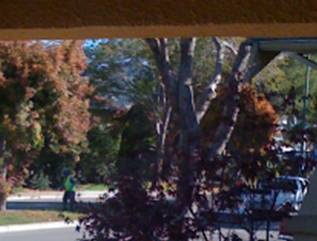City of Oakland Pesticide "Ban"
Is A Sham:
REVOKE ALL
EXEMPTIONS!
SIGN ONLINE PETITION TO REVOKE
ALL EXEMPTIONS HERE
DOWNLOAD PETITION TO DISTRIBUTE
HERE
Please send signed petitions to:
Don't Spray California, 2399 E.14th Street #24, San Leandro, CA 94577
In 1997 the Oakland
City Council unanimously voted in Resolution
73968 C.M.S., "adopting Integrated Pest Management Policies". This
self-described "ban on pesticides", recognizes that pesticide use
presents a hazard to people and the environment. However, the many
exemptions to the ordinance renders the pesticide ban a meaningless
sham, and endangers residents, workers, visitors, and the environment
of the City of Oakland and surrounding areas.
1997 IPM Ordinance -
Oakland's Pesticide "Ban"
While recognizing the
health hazards of pesticides, one of the
ordinance exemptions irrationally exempts pesticide use that is
"required to
preserve and/or protect human health and safety", according to
"guidelines established by the Alameda County Health Agency". It is
unclear what pesticide use could be "required", but both city and county health
agencies are frequently involved in "fogging"
of neighborhoods with
insecticides for mosquitoes, for example, and routinely promote
toxic
chemical use on children to repel ticks, fleas, and
mosquitoes.
The exemptions
cover vast categories of pesticides, including
pesticidal
soaps, insect growth regulators, microbials, botanicals, synthetic
pyrethroids, horticultural oils, insecticidal bait stations, the
category 1 pesticide aluminum phosphide on sports fields, as well as
swimming pool chemicals, disinfectants, and antimicrobials, and other
undisclosed pesticides, including for "weed control", in other words
herbicides, in various locations.
The exemptions also
cover vast areas of the city, including "weed
control" during construction of any new landscaping and ball fields,
and
around "selected" fire hydrants, as well as undisclosed pesticides at
the Oakland Museum, municipal golf courses, putting and lawn bowling
greens, sports fields, swimming pools, public streets and
rights-of-way, and the Morcom Rose Garden (though herbicides are
specifically not
exempted at the latter). Many of the locations of pesticide
use are unavoidable, and all present obstacles for equal access
especially for many disabled people.
One
of the most extensive of the exemptions to Oakland's pesticide ban
allows the city's Public Works Agency (PWA) to conduct widespread
pesticide applications throughout the city. According to a 2007
phone conversation with James Ryugo, Building Services Manager at the
PWA, to whom neighbors are being referred when inquiring about the
pesticide applications, the agency does not post schedules for when they spray
because of weather
unpredictability, but to get an idea of some of the
areas under the
agency's jurisdiction, these three documents outline some limited sort
of "schedule" of "Hubs for Maintenance of Parks, Medians and
Streetscapes" on the PWA website:
East
Oakland Hubs for Maintenance of Parks, Medians and Streetscapes
North
Oakland Hubs for Maintenance of Parks, Medians and Streetscapes
West
Oakland Hubs for Maintenance of Parks, Medians and Streetscape
While limited warning signs are required
before pesticide applications, in order to read them one is often
already exposed to the pesticides. According to Mr. Ryugo, red signs are posted a day or two before
application, smaller white
signes are posted for a couple of days after, and blue/green dye is
added to the chemical mix. Ryugo claimed that they don't spray when rain is in the forecast,
but neighbors have reported seeing the dye
wash into the storm drains during rain. He also vaguely specified that pesticide
applications on city medians are being made between late Fall to early
Spring, during rainy season.
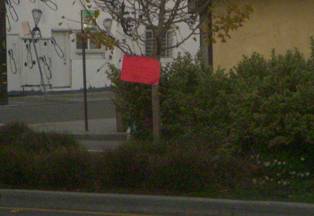
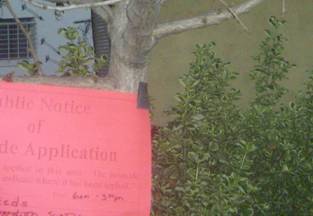
Red notices before applications near San Pablo and Alcatraz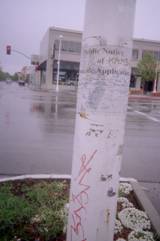
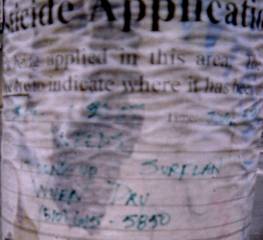
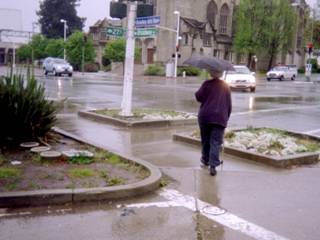 White notices after applications at Broadway and 27th
White notices after applications at Broadway and 27th
As witnessed on signs
announcing such applications in our neighborhoods, two pesticides the
PWA uses on medians, including those across from especially vulnerable
sites such as Children's Hospital and the Sojourner Truth Manor senior
home on Martin Luther King Jr. Way, are Roundup and Surflan, the dangers
of which have been known since at least the 1990's.
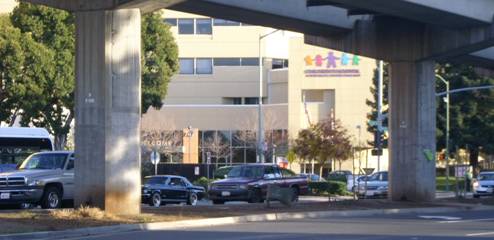
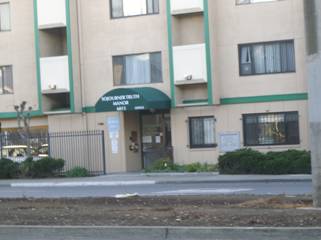 PWA's toxic medians endangering sick children and elders
PWA's toxic medians endangering sick children and elders
Glyphosate,
the active ingredient of Roundup, has been linked to cancers,
reproductive harm, genetic damage, thyroid disorders, respiratory
illnesses, and other ailments. Glyphosate contains POEA, a surfactant
contaminated during manufacture by 1,4 dioxane. Metabolites and
breakdown products of glyphosate include formaldehyde. Both 1,4 dioxane
and formaldehyde are recognized as carcinogens under Proposition 65. In
spite of manufacturer's claims to the contrary, glyphosate is mobile in
soil, measurable up to 3 years after application, and spread by rain
water runoff. It has been found in watersheds, groundwater, and even
drinking water. Its manufacturer Monsanto has been sued and fined
repeatedly for false claims about this and other products' safety, most
notoriously Agent Orange.
Mr. Ryugo, when challenged by Oakland neighbors about the use of
Roundup, included the following Material Safety Data Sheet (MSDS) in
his correspondence to defend the agency's use of
it. MSDS's are produced by the manufacturers of
products, and predictably downplay the dangers of their products,
including by lack of disclosure of so-called "inert" ingredients, which
are protected by trade secret laws, but are frequently more toxic than
the so-called "active" ingredient, and are specifically designed to act
synergistically to increase the toxicity of the product.
Monsanto's MSDS for
Roundup Pro sent to neighbors by Ryugo in August 2008
In March 2010 neighbors spotted a notification that the median on
Telegraph and MacArthur will be sprayed by April 15. The notice
specified that the product to be used is Ranger Pro, with blue dye.
Perhaps in an effort to confuse those who expressed concern about the
use of Roundup, including City Council member Jane Brunner, PWA
switched products, though Ranger, like Roundup, continues to be a
glyphosate product made by Monsanto.
MSDS for Ranger Pro
Label for Ranger Pro
For thorough toxicological profiles and more details about Roundup and other glyphosate products,
produced by independent sources, not by the manufacturer of the poison,
see:
What's
Wrong With Roundup? Everything!
The other pesticide
used by the PWA, oryzalin,
the active ingredient of Surflan, is linked to reproductive harm,
central nervous system depression, is a possible human carcinogen
according to the U.S. Environmental Protection Agency (EPA), and is
contaminated during manufacture by N nitrosodipropylamine (NDPA), a
confirmed human carcinogen under Proposition 65. It is mobile in soil
and has contaminated rivers, streams, and wells. Its manufacturer, Dow,
another manufacturer of Agent Orange, has also been fined for false
safety claims.
Surflan
Toxicological Profile
Volunteers
for the Public Works Agency's Keep Oakland Beautiful and Adopt-A-Spot
program commit countless hours of labor to maintain public spaces in
their neighborhoods, often to prevent use of chemicals. Instead
volunteers are being exposed to toxic pesticide applications by the PWA
on their adopted spots, putting them at grave risk of serious health
problems, and volunteers have in fact already been injured.
In 2005 one volunteer
found the city still supportive of his efforts, when he explained his
approach to drought tolerant planting in this video:
"Frank Snapp
- Plant Fascist" (Don't worry, Frank is not really a fascist...)
In the Trenches with a Guerilla Gardener Article about Frank's work in Oakland Magazine April 2007
Guerilla Gardening as Alternative to Spraying of Urban Sites by Frank, about how to do it yourself
In March 2007,
however, Frank was injured when he discovered that his adopted median had been
sprayed with Roundup. Waivers of liability,
which volunteers have to sign to participate in the Adopt-A-Spot
program, protect the city from being held accountable for poisoning
volunteers:
Frank's Exposure Symptoms
March 2007
Frank's
Pesticide Alert to Local Listserves 2007
Meanwhile in another
part of town, along the edge of Lake Merritt at Grand and Harrison, a
neighbor also publicized concerns over the PWA pesticide applications
endangering people and pets:
2007 Craig's List Post about Pesticide Applications at Lake Merritt
In June 2009 about 60 volunteers planted medians along 40th Street and Market, in a great show of force of how public spaces could and should be maintained:
In
November 2009, apparently uninspired by the recent example of
volunteers greening the nearby median, the PWA continued its toxic
actions and the 51st Street median got sprayed again, in spite of
repeated requests from neighbors not to be exposed to pesticides on
this median outside their homes. After Ryugo's expressed "willingness" last year to discuss not spraying there, neighbors did not even receive a courtesy email to alert them that such "discussions" had apparently been fruitless.
PWA in action, spraying a median on 51st Street against the repeatedly expressed will of neighbors
Our Letter to Oakland City Council, Mayor Ron Dellums, City Attorney John Russo 2009
in response to continued spraying on 51st Street, includes
toxicological profiles and previous communications from Oakland
residents with Jim Ryugo and other city officials
In 2008 the City of Oakland Auditor
launched a performance audit of the Public Works Agency. East Bay
Pesticide Alert/Don't Spray California took the opportunity to protest
the use of poisons by the PWA:
Our Letter to City Auditor Courtney Ruby 2008,
urging that the Public Works exemption to the pesticide ban be revoked,
includes previous correspondence with Jim Ryugo and toxicological
profiles.
Instead of
taking seriously our concerns and those of Oakland neighbors, as
well as those implied in the original intent of the city's pesticide
ordinance, about the dangers of pesticides, the office of the city
auditor, together with the Matrix Consulting Group, released their
audit report in April 2009, recommending increased pesticide use and
eliminating people's jobs (see particularly recommendations 167
and 257).
Public Works Agency Performance Audit
The report also recommends
that the city "pilot" test organic herbicides and mulches on vacant
lots (see recommendation 258), but does not specify what precisely is meant with "organic".
While this may sound promising, as we have found with many pesticides
that are legally labeled "organic", they often include undisclosed
synthetic "inerts", and whether of biological or laboratory origin, all
ingredients may do damage to unintended targets (see for example Btk use in Ojai). Pesticides by definition are aimed to kill,
and it is illegal to claim that any pesticide is safe.
Nontoxic
alternatives exist
for all pesticide use. The former pesticide applicator Steve Tvedten
counsels individuals, businesses, and municipalities around the globe
extensively in nontoxic alternatives to pesticides, and makes his book
on the subject available at his website for free:
The Best Control 2, or what the poison "industry" does not want you to know - An Intelligent Pest Management Manual by Stephen Tvedten
"Weed control" can
be easily accomplished by a combination of sheet mulching with layers
of cardboard and wood chips, and diverse plantings, which nurtures,
rather than destroys, the soil and organisms that keep it healthy.
So-called "weeds" serve a purpose in nature. They volunteer where
damaged soil cannot support any life except the hardiest. They signal a
first step towards a return to healthy soil. Pesticides suppress
natural processes, which are not being given their proper time to work.
Other nontoxic options for more conventional "weeding", include
hand-pulling, using a weed wrench, steam, or radiant heat weeder.

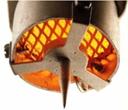
Radiant heat weeder, wand and detail of heating plate
Radiant heat weeders are used in a
similar fashion as the spray wands used by the PWA now. They do not
require more labor, more strength, a license to use, nor doctor visits
due to poisoning.
If
the City of Oakland has funds for expensive chemicals and licensed
pesticide applicators, it can certainly afford manual labor and
volunteer coordinators.
Revoke all
exemptions of City of Oakland Resolution 73968 C.M.S.!
Follow the examples of other
California municipalities, such as Arcata and Fairfax, and institute a
real pesticide ban!
Even the City of Berkeley's imperfect pesticide ordinance more closely resembles a ban, and it shows:
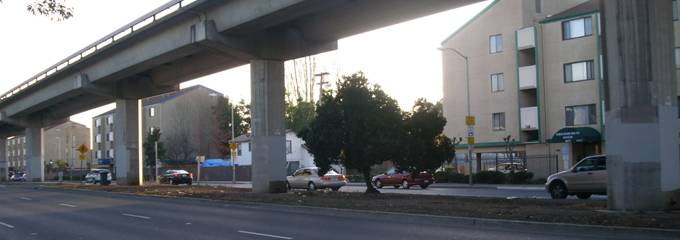
On Martin Luther King Jr. Way in Oakland, dead soil everywhere the eye can see...
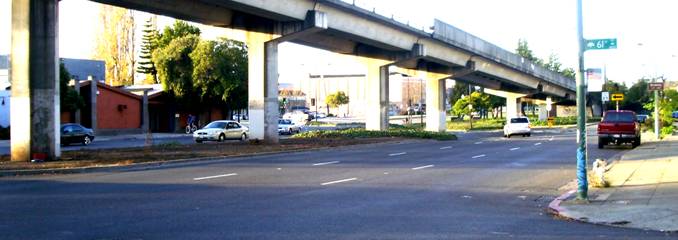 ...until the Berkeley border - like a line drawn in the sand between dead toxic dirt and lush green life
...until the Berkeley border - like a line drawn in the sand between dead toxic dirt and lush green life
There is no safe use of pesticides.
People,
pets, wildlife and biodiversity is threatened with exposure to
pesticides which continues after any application has been completed.
Pesticides translocate by vaporization, drift, movement into soil and
water tables, getting washed down storm drains into the bay, getting
tracked into homes and schools where kids and pets play on the floor or
outdoors where pesticides have been applied on lawns or trees, drifting
onto play equipment, and can cause poisoning via inhalation, ingestion,
absorption.
Watch
out for notification signs in your neighborhood, alert your neighbors
of the danger, take back your streets by adopting medians, guerilla garden, organize resistance, protest, prevent applications. It not only is our right, but our human duty to use our
nonviolent strength to stop such poisoning.
How will you stop the
poisonings of your family and neighborhood
whether by city, state, or federal agencies, your landlords, or the
neighbors you like?
Sign and distribute the petition to revoke the exemptions to Oakland's
pesticide ban. But don't stop there. Get creative. It’s time for action!
Page last updated 3/25/10









